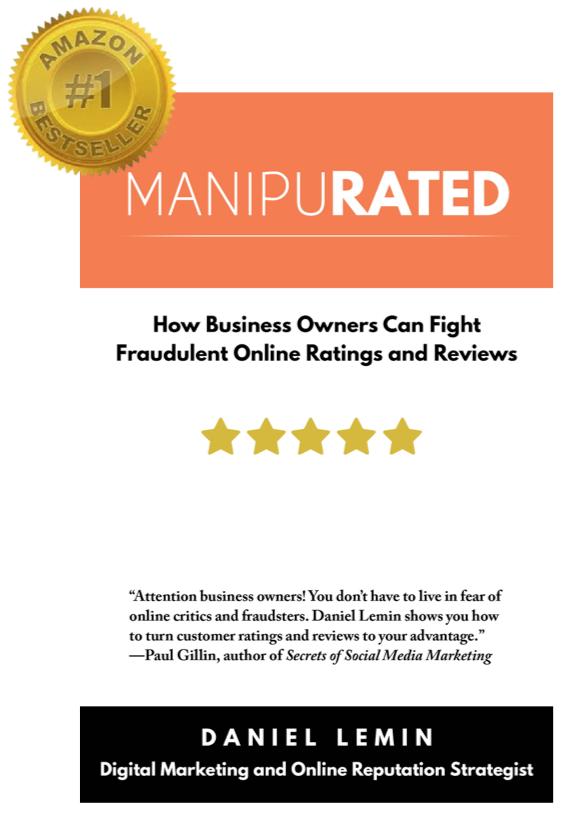Daniel Lemin leads strategic planning at Convince & Convert. He's a digital marketing strategist, an authority on the reputation industry, and author of the new book Manipurated.
Don't miss a MarketingProfs podcast, subscribe to our free newsletter!
An early Google hire, he was a pioneer in realizing the business impact of online ratings and reviews, and the ongoing struggle business owners have to maintain a positive online reputation.
Daniel is a respected expert on digital marketing, public relations, and reputation management and consults for prominent Fortune 500 companies, including Nestlé USA, Procter & Gamble, Hilton Hotels, Sony, Suzuki Motors, Munchkin, and Best Buy.
I invited Daniel to Marketing Smarts to talk about online reviews and ratings, including how fake reviews can wreak havoc on your brand image, how to handle genuine negative reviews, and how your business can improve its online reputation.
Here are some highlights from my conversation with Daniel:
View negative comments as helpful feedback rather than as unjustified whining (07:00): "The easiest way to short-circuit a bad review is to make it easy to get in touch with you and fix the problem first. That's a huge opportunity for businesses. One of the guys in [Manipurated], Andrew DiFeo, he runs an auto dealer in Florida, St. Augustine. It's a Hyundai dealer... Not everybody loves their auto dealer. They get mixed reviews for the most part, so he really made it a point to listen to feedback. In his case, it's on this website [for reviewing auto dealers called] DealerRater....
"He is so intensely focused on improving the customer experience from front to back. He said 'I'm not necessarily after a five-star review, I'm after a repeat customer who wants to come back and buy another car from me.' It's very common in the car industry...'whatever it takes to get the deal done, I'm never gonna see this customer again.' That's kind of the mentality. And he's...a second-generation or third-generation auto dealer owner. He recognized that he wants to do it differently, so he uses reviews to flush out the problems in his business and get rid of them. Fix them. It's a different approach, but it helps improve...his reputation because the experience is so authentically good."
The worst response to a negative review is no response, because ignoring complaints makes it seem as though you don't care about your customers (09:25): "It's not so much the content of the review. It's what the business does with it. If they...say 'I'm really sorry you had that experience at my restaurant. That's not how I intend that dish to taste... Please come back and try us again. I think you'll find it totally different your second time.' Or however they confront that, it's the response to it...that can overcome some of that negativity.
"Jay Baer is working on his new book, Hug Your Haters, and it's all about the science of complaints: why we complain and what it means for a business..,. If you respond to a negative complaint—to a 'hater' in his parlance—they're something like 20% more likely to become an advocate for your business from that point forward. So, it isn't so much that maybe you didn't have a chance to fix the problem (and maybe it's not a fixable problem), but the fact that you said 'I'm really sorry you had that experience' at least...ensures that they know...you care."
You don't have to "surprise and delight," but at least fix the problem (10:45): "The thing with anything customer-service related, you're not necessarily looking for magic. You're just looking for relief. If you can just fix the problem, that's all people really care about in most complaint-oriented environments."
Yes, people do spend time (and money) on fake reviews (11:00): "There's a whole other side to reviews, which is a little bit more nefarious. Not just complaints: There's a lot of fake and fraudulent stuff, too....
"Fake reviews, fraudulent reviews, it's kind of a zero-sum game.... It doesn't help the business. It doesn't make the site that's hosting the review look good, certainly, and it doesn't help the consumer make a better, smarter choice. The thing is, there's money to be made with fake reviews, and if you follow the money, it either leads back to the business itself, [or] sometimes it leads back to a different business [like a competitor]."
Daniel and I talked about much more, so be sure to listen to the entire show, which you can do above, or download the mp3 and listen at your convenience. Of course, you can also subscribe to the Marketing Smarts podcast in iTunes or via RSS and never miss an episode!
You can learn more about Daniel's new book at Manipurated.com, and be sure to check out his posts at Convince & Convert. You can also follow him on Twitter at @DanielLemin.
This episode brought to you by Experian Marketing Services:
Re-think the traditional customer journey. Build a scalable framework that, like a "choose your adventure" novel, responds to each customer's decisions to deliver a unique path of experiences. Download our free guide to see how you can create intelligent interactions with your customers, every time.
Music credit: Noam Weinstein.
...sign up for free to continue reading
Don't miss a MarketingProfs podcast, subscribe to our free newsletter!
Published on December 2, 2015






 Daniel Lemin, an expert on digital marketing, public relations, and reputation management. Daniel is senior strategist at
Daniel Lemin, an expert on digital marketing, public relations, and reputation management. Daniel is senior strategist at 
